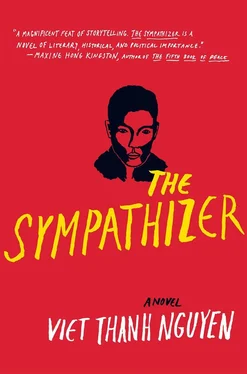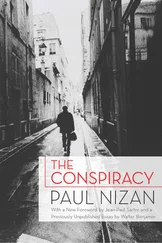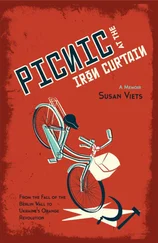I confess that the major’s death troubled me greatly, Commandant, even if it does not trouble you. He was a relatively innocent man, which was the best one could hope for in this world. In Saigon, I could have depended on my weekly visits to the basilica with Man to discuss my misgivings, but here I was alone with myself, my deeds, and my beliefs. I knew what Man would say to me, but I just needed him to say it to me again, as he had on other occasions, such as the time I passed to him a cartridge of film recording the heliborne assault plans of a Ranger battalion. Innocent men would die as a result of my actions, wouldn’t they? Of course men will die, Man said, masking his words behind his folded hands as we knelt in a pew. But they aren’t innocent. Neither are we, my friend. We’re revolutionaries, and revolutionaries can never be innocent. We know too much and have done too much.
I shivered in the humid climate of the basilica while the dowagers droned. As it was in the beginning, is now, and ever shall be, world without end. Amen. Contrary to some perceptions, revolutionary ideology, even in a tropical country, is not hot. It is cold, man-made. Little surprise, then, that revolutionaries needed natural heat sometimes. Thus, when I received an invitation to a wedding not long after the crapulent major’s demise, I accepted with enthusiasm. Sofia Mori was my curious guest to this reception for a couple whose names I had to check on the invitation before greeting them. The bride’s father was a legendary marine colonel whose battalion fought off an NVA regiment during the Battle of Hue with no American assistance, while the groom’s father was the vice president of the Saigon branch of Bank of America. His family had fled Saigon on a jet chartered by Bank of America, thus avoiding the indignity of the refugee camps. The most distinctive thing about the vice president, besides his air of effortless distinction, was the Clark Gable mustache playing dead on his upper lip, an adornment favored by southern men who fancied themselves debonair playboys. I had received an invitation since I had met the man several times in Saigon as the General’s aide. My status was indicated by how far I sat from the stage, which is to say very far. We were positioned near the restrooms, buffered from the scent of disinfectant only by the tables for the children and the band. Our companions were a couple of former junior officers, two mid-tier bank executives who had found lower-tier jobs with Bank of America branches, an in-law who looked inbred, and their wives. In dire times I would not merit a seat, but now we were more than a year into our American exile, and flush times had returned for some. The Chinese restaurant was in Westminster, where the man with the Clark Gable mustache had settled his family in a ranch-style suburban home, a demotion from his villa in Saigon but many rungs above almost all the evening’s attendees. Westminster was Sonny’s town, and I spotted him at a table several rings closer to the center of power, Clark Gable’s attempt to ensure positive press coverage.
Despite the noise and activity in the restaurant, where Chinese waiters tucked into red jackets scurried through the maze of banquet tables, a touch of melancholy pervaded the huge dining room. The bride’s father was notably absent, captured along with the remnants of his battalion as they defended the western approach to Saigon on the last day. The General praised him at the beginning of the banquet in a speech that stirred emotions, tears, and drinks. All the veterans toasted the hero with voluble bursts of bravado that helped to obscure their own uncomfortable lack of heroism. One simply must grin and drink unless one wants to sink to one’s neck in the quicksands of contradiction, or so said the sad crapulent major, his severed head serving as the table’s centerpiece. So I grinned and poured cognac down my throat. Then I mixed a libation of Rémy Martin and soda for Ms. Mori while explaining the exotic customs, habits, hairstyles, and fashion of our fun-loving people. I yelled my explanations, struggling to be heard over the loud cover band that was fronted by a petite dude in a sequined blazer. He sported a glam rocker’s perm modeled on a Louis XIV wig, minus the powder, and strutted on gold platform shoes while fondling his mike, pressing the ball of it to his lips suggestively as he sang. The heterosexually certified bankers and military men absolutely loved him, roaring approval at every flagrant pelvic gesture of flirtation from the singer’s extraordinarily tight satin pants. When the singer invited manly men to the stage for a dance, it was the General who immediately offered himself. He grinned as he sashayed with the singer to “Black Is Black,” the theme song of riotous Saigonese decadence, the audience cheering and clapping in appreciation, the singer winking over his shoulder à la Mae West. This was the General’s element, among men and women who appreciated him or who knew better than to voice any disagreements or discomfort with him. The execution — no, the neutralization —of the poor crapulent major had pumped life back into him, enough so that he had masterfully eulogized at the funeral. There he praised the major as a quietly self-sacrificial and humble man who always performed his duties to country and family without complaint, only to be tragically cut down in a senseless robbery. I had taken photographs of the funeral with my Kodak, the images later dispatched to my aunt in Paris, while Sonny sat in the front row of mourners, taking notes for an obituary. After the funeral, the General slipped the widow an envelope of cash from the operational funds provided by Claude, then stooped to peer into the bassinet where Spinach and Broccoli slept. As for myself, I could only mumble something generically appropriate to the widow, whose veil cloaked a waterfall of tears. How was it? Bon asked when I came home. How do you think? I said, heading for the refrigerator, its ribs lined as always with beer. Besides my conscience, my liver was the most abused part of my body.
Weddings often exacerbated the abuse, aggravated by the sight of a happy, innocent bride and groom. Their marriage might lead to alienation, adultery, misery, and divorce, but it might also lead to affection, loyalty, children, and contentment. While I had no desire to be married, weddings reminded me of what had been denied to me through no choice of my own. Thus, if I began every wedding as a pulp movie tough guy, mixing laughs with the occasional cynical comment, I ended each wedding as a watered-down cocktail, one-third singing, one-third sentimental, and one-third sorrowful. It was in this state that I took Ms. Mori to the dance floor after the wedding cake was cut, and it was then, near the stage, that I recognized one of the two female singers taking turns at the microphone with our gay blade. She was the General’s oldest daughter, safely ensconced in the Bay Area as a student while the country collapsed. Lana was nearly unrecognizable from the schoolgirl I had seen at the General’s villa during her lycée years and on summer vacations. In those days, her name was still Lan and she wore the most modest of clothing, the schoolgirl’s white ao dai that had sent many a Western writer into near-pederastic fantasies about the nubile bodies whose every curve was revealed without displaying an inch of flesh except above the neck and below the cuffs. This the writers apparently took as an implicit metaphor for our country as a whole, wanton and yet withdrawn, hinting at everything and giving away nothing in a dazzling display of demureness, a paradoxical incitement to temptation, a breathtakingly lewd exhibition of modesty. Hardly any male travel writer, journalist, or casual observer of our country’s life could restrain himself from writing about the young girls who rode their bicycles to and from school in those fluttering white ao dai, butterflies that every Western man dreamed of pinning to his collection.
Читать дальше












